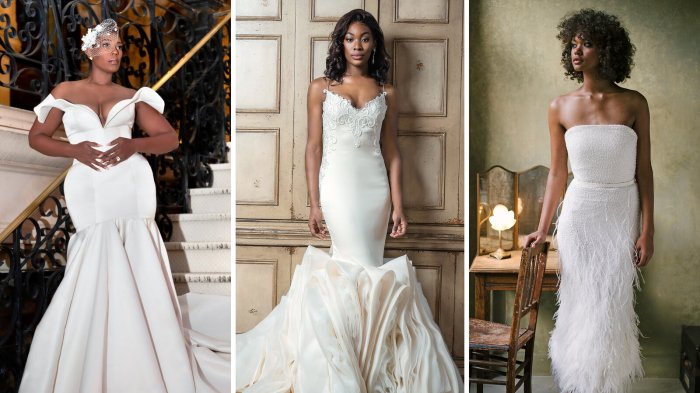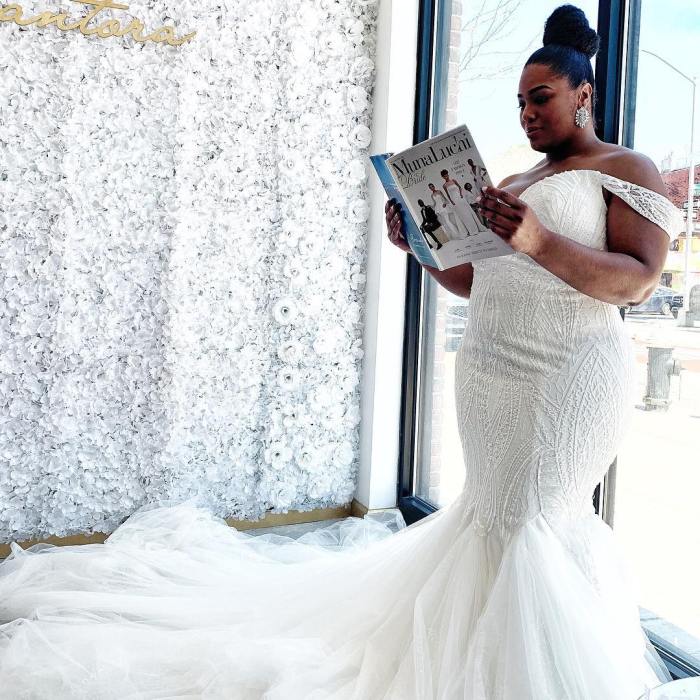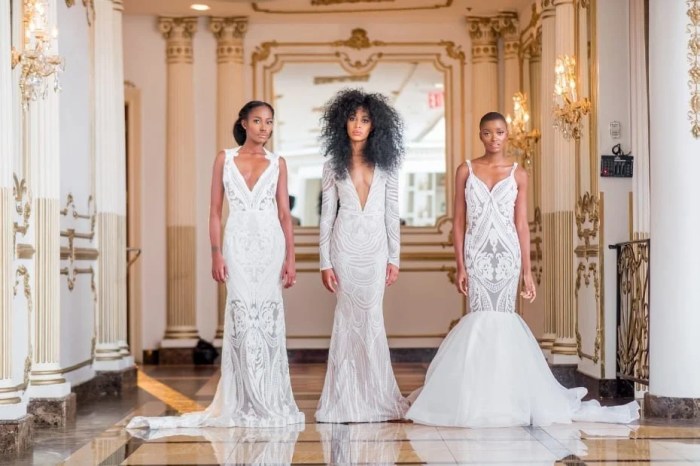A Rich History: Black Wedding Dresses Through Time: Black People Wedding Dresses

Source: nyt.com
Black people wedding dresses – The evolution of Black wedding attire reflects a complex interplay of cultural heritage, social influences, and personal style. From the subtle adaptations of Western traditions to the vibrant embrace of African aesthetics, Black brides have consistently shaped and redefined the landscape of wedding fashion. This exploration delves into the historical context, modern trends, cultural significance, and the ongoing pursuit of representation within the industry.
The beauty of black people wedding dresses is incredibly diverse, showcasing a range of styles and silhouettes. For those seeking a second dress, perhaps for a more casual reception or a change of pace, options abound; consider exploring the wonderful selection of 2nd wedding dresses plus size for comfortable and stylish alternatives. Ultimately, the perfect dress, whether a first or second, reflects the individual’s personality and style, and this is especially true for the vibrant and varied styles seen in black wedding attire.
Historical Context of Black Wedding Attire
The history of Black wedding attire is multifaceted, shaped by both the adoption of Western traditions and the enduring influence of African and diasporic cultures. Early depictions of Black weddings in America often show a blend of available resources and adapted European styles. The availability of fabrics and the socio-economic realities of the time significantly influenced dress choices. Post-slavery, as Black communities gained more economic independence, there was a gradual shift towards more elaborate and personalized wedding attire.
Iconic dresses from different eras reflect these changes. For instance, the simpler, more utilitarian styles of the early 20th century gradually gave way to more ornate designs incorporating lace, satin, and other luxurious fabrics as the mid-20th century progressed. The civil rights movement and the rise of Black designers further propelled the creation of unique and culturally relevant wedding styles.
| Traditional Western Attire | Styles Commonly Seen in Black Weddings |
|---|---|
| White gown, long veil, fitted silhouette | White or off-white gowns, varying silhouettes (A-line, ballgown, mermaid), incorporation of African prints or embellishments |
| Emphasis on lace, tulle, satin | Diverse fabrics including lace, satin, silk, African wax prints, brocade |
| Simple, classic accessories | Headwraps, statement jewelry, colorful accents |
Modern Trends in Black Wedding Dresses
Contemporary Black wedding dresses showcase a breathtaking range of styles, reflecting the diverse tastes and cultural backgrounds of Black brides. Influential designers and social media platforms have played a significant role in shaping these trends. The focus is increasingly on individuality, self-expression, and celebrating cultural heritage.
- Popular styles include A-line gowns, ballgowns, mermaid silhouettes, and sheath dresses.
- Incorporation of African prints, lace, and intricate beadwork are common details.
- Color palettes range from classic ivory and white to bolder hues like blush pink, gold, and jewel tones.
Designers who cater to Black brides often emphasize inclusivity and body positivity, offering a wider range of sizes and styles.
- Designer A: Known for their use of luxurious fabrics and intricate embellishments, celebrating traditional African techniques.
- Designer B: Focuses on creating modern, minimalist designs that are both elegant and empowering.
- Designer C: Specializes in incorporating bold colors and unique silhouettes, reflecting the vibrancy of African culture.
Cultural Significance of Fabrics and Colors, Black people wedding dresses

Source: essence.com
Fabric and color choices in Black wedding attire hold deep cultural significance. The selection reflects personal style, family traditions, and a connection to ancestral heritage. Certain fabrics and colors carry symbolic weight, representing themes of prosperity, fertility, and spiritual connection.
For example, lace often symbolizes elegance and sophistication, while African prints represent cultural pride and heritage. The use of silk signifies luxury and refinement. Color choices can vary widely, with white often signifying purity, while bolder hues like gold and red can represent joy, prosperity, and strength.
A visual representation of contemporary fabrics and colors might include a rich tapestry of ivory lace juxtaposed with vibrant Ankara prints, shimmering gold brocade interwoven with deep jewel-toned silks, and delicate blush pink tulle accented with intricate beadwork.
The Role of Accessories and Styling
Accessories play a vital role in completing the Black bridal look, adding personal touches and enhancing the overall aesthetic. From headwraps and statement jewelry to veils and elaborate hairstyles, these elements contribute significantly to the overall presentation.
Headwraps, for instance, can be both a fashionable statement and a powerful symbol of cultural identity. Similarly, carefully chosen jewelry can add a touch of elegance or a bold pop of color. Hairstyles range from sleek updos to elaborate braids, each reflecting the bride’s personal style and preferences.
A simple gown can be transformed into a statement piece through the strategic use of accessories and styling. A carefully chosen headwrap, striking earrings, and a bold lip color can elevate a classic dress, adding a unique and personal touch.
Representation and Inclusivity in the Wedding Industry

Source: shoppeblack.us
While progress has been made, challenges remain for Black brides in finding wedding attire that fully reflects their unique styles and cultural backgrounds. The lack of representation in mainstream bridal fashion has historically limited options, leading to a need for greater inclusivity and diversity within the industry.
Initiatives promoting diversity and inclusivity are gaining momentum. This includes designers creating lines specifically for Black brides, boutiques offering a wider range of sizes and styles, and online platforms showcasing diverse models and designers. This increased visibility is crucial for empowering Black brides and celebrating their unique beauty.
- Online retailer specializing in diverse bridal wear.
- Boutique featuring designers who cater to a wide range of body types and cultural backgrounds.
- Directory of Black-owned bridal businesses.
Questions Often Asked
What are some common misconceptions about Black wedding dresses?
A common misconception is that Black brides only wear traditional African prints. While African prints are beautifully incorporated, many Black brides choose a variety of styles and fabrics, reflecting their personal preferences and cultural backgrounds.
Where can I find Black-owned wedding dress boutiques?
Numerous online directories and resources highlight Black-owned bridal boutiques and designers. Searching online for “Black-owned bridal shops” will provide a starting point for your search.
How can I incorporate cultural elements into my wedding dress without feeling overly themed?
Subtle incorporation can be achieved through details like fabric choices, embroidery, or jewelry. For example, incorporating small details of African beadwork or a subtle African print sash can add cultural significance without overwhelming the overall design.
Are there specific etiquette guidelines for Black weddings regarding attire?
Etiquette varies greatly depending on the specific cultural traditions and preferences of the couple. It’s always best to consult the wedding invitation or contact the couple directly for any specific guidance.
